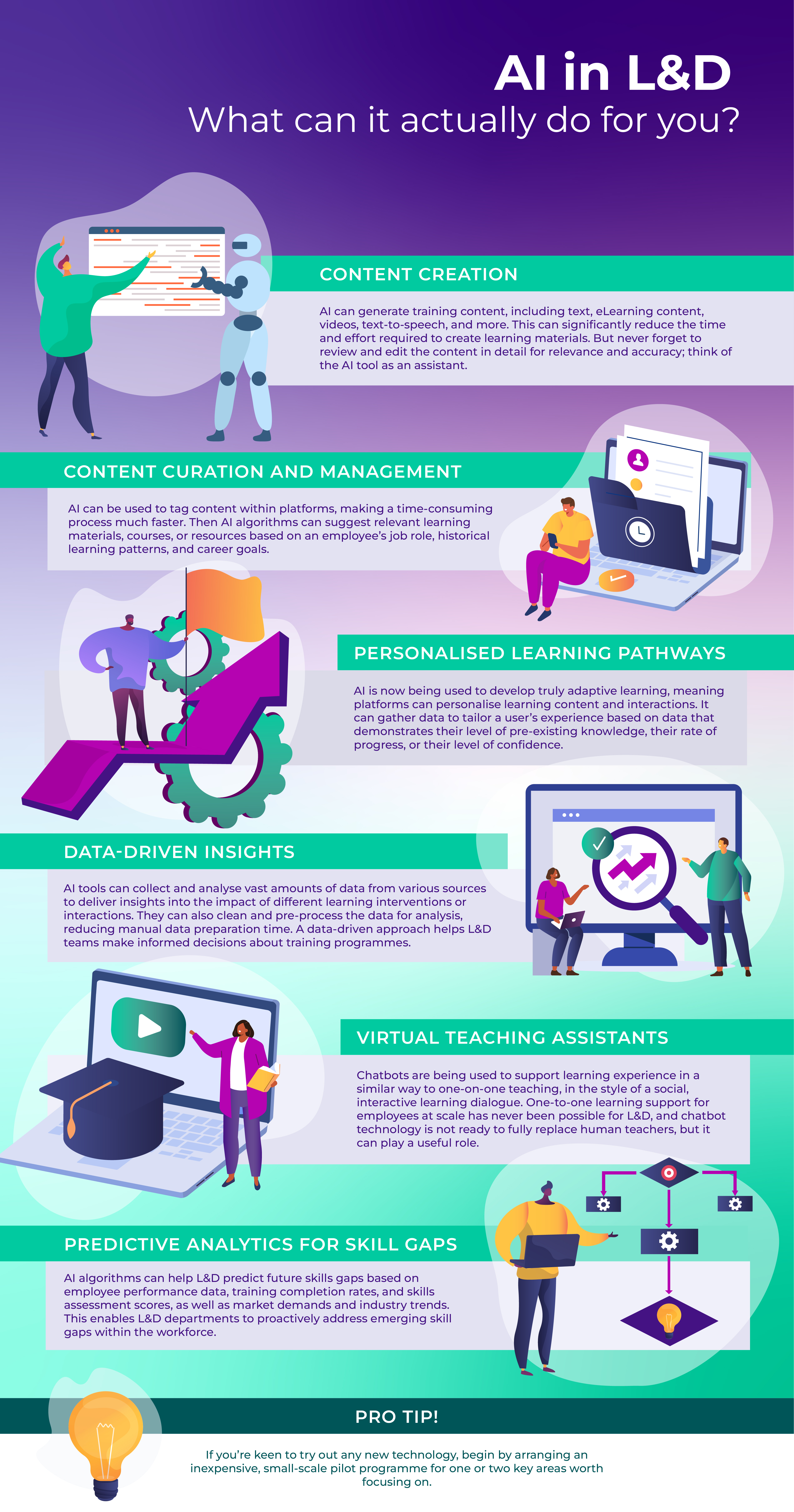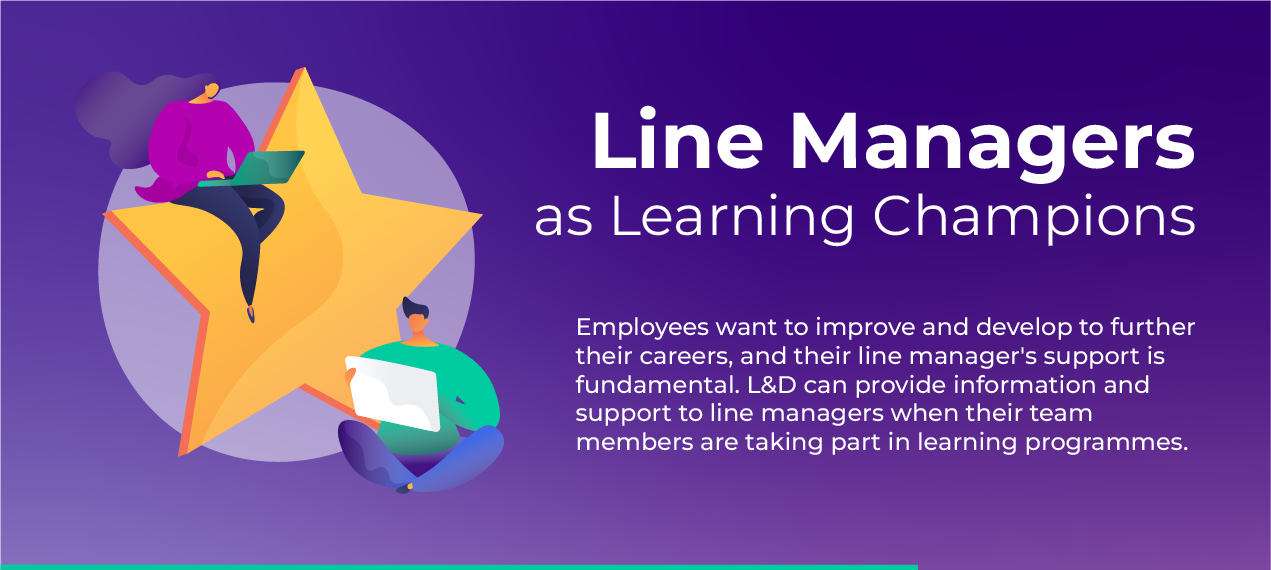L&D professionals are challenged to provide multiple services that answers the needs of their diverse workforce and the future skills needs of the organisation. They have to be adept at creating solutions for diverse internal technical, process, change, sales programmes (and much more) as well as catering for personal development, management training, leadership and generic professional skills. They must also meet demanding user experience standards.
Classroom training vs elearning
'Skills can and do expire. Organisations need people who can continually learn and adapt'. McKinsey
L&D teams are constantly under pressure to ensure that workplace learning keeps up with the pace and scale that innovation and changes in technology brings. As skills become outdated, they need to be able to upskill and reskill large portions of the workforce quickly and efficiently. A growing need for diverse skill sets requires learning content to be updated regularly, and be readily available to employees at their time of need.
In the past, the solution options were limited to endlessly taking orders for and scheduling classroom courses or to purchase some old school generic content for access on a clunky Learning Management System (LMS). Generally our workforces loved attending expensive classroom events, almost a perk, but with little data to demonstrate how they put their new skills into practice. On the other side, very few people on the planet ever enjoyed the combined clunky LMS and old school click next elearning modules approach either.
Thankfully, times have changed.
Modern off the shelf digital learning content is fast becoming the delivery solution of choice because of its adaptable, accessible and scalable functionality. See how top companies like BT, Royal Bank of Scotland, and Bayer have utilised off the shelf content to transform their L&D strategies.
reimaging personal and professional development has been reimagined
Advancements in today’s market for both learning technology and off the shelf courses have broken through previous barriers to deliver engaging experiences and meaningful results.
The introduction of Learning Experience Platforms (LXP) allow a website-style user experience that goes way beyond the capabilities of a traditional LMS. LXPs give the learner an exceptional user experience with personalised learning paths, easy to access content, and AI and data-driven insights. Learning can be completed on desktop and mobile devices both online and offline.
With topics including leadership development, business skills, developer solutions and digital skills, current and future needs can be taken care of. The content has been revitalised through the use of multi-modal assets with articles, podcasts, blogs, ebooks, book summaries, and videos. There are also practice tests to make information much more relevant and easier to consume for the modern worker. It is a true mixture of courses and resources.
The content variety on its own is impressive but when coupled with the immersive and adaptive experience of a learning experience platform, its potential to deliver effective learning results has increased massively.
5 reasons why off the shelf content addresses L&D challenges
Here are 5 reasons why digital off the shelf learning content should be an essential part of your L&D learning strategies.
1. Provides the learning that employees need to stay competitive in the face of innovation
A Bersin by Deloitte study, found that :
90% of organisations surveyed believe their core business is threatened by new digital competitors and 70% believe they do not have the right leadership, skills, or operating models to adapt.
To stay competitive in a landscape of disruptive innovation, workforces need to be able to evolve. By taking advantage of new developments in technology-enabled training, and providing the opportunity and resources for continuous learning in the workplace, employers in every industry can meet this imperative.
Off the shelf elearning courses are used to support continuous learning and develop a strong learning culture where employees and leaders will become deeply engaged in the learning experiences offered to them. Even more vital, they’ll stand a better chance of acquiring the skills essential for helping their organisations succeed not just today, but in a future that could look completely different to the current business climate.
Ready-made content provides essential future skills that could not be created in house in the same time frame. It allows L&D develop internal talent and increase training effectiveness through the state-of-the-art Instructional design methodologies. Curated learning journeys such as Aspire ensure that roles prone to digital disruption such as software developers have the skills needed to perform in future technology roles.
2. Close your future skills gaps now
According to the World Economic Forum, we are on the verge of a technological revolution that is predicted to “fundamentally alter the way we live, work, and relate to one another”. Known as the Fourth Industrial Revolution, this disruption will be felt in every industry and in every country, and the 10 top skills required to survive are:
Complex Problem Solving, Critical Thinking, Creativity, People Management, Coordinating with Others, Emotional Intelligence, Judgment and Decision Making, Service Orientation, Negotiation, and Cognitive Flexibility.
The reality is that most organisations are not prepared for this revolution and do not have the in-house talent ready to tackle the future business environment. The challenge for any L&D department is to provide the extent of learning content that people need to develop these skills now.
Off the shelf digital learning content provides the ideal medium to impart these valuable soft skills and show employees how to communicate effectively and be resilient and innovative problem solvers. The multi-modal assets can help demonstrate and foster the link between emotion and cognition so employees can lead and perform in challenging times. Read more about Training and Development skills for the digital age.
3. Provide high-impact, low-cost learning in the moment of need
Remember when TV channels were limited and you had to make do with what someone else wanted to watch? Or, if you missed a programme you had to wait for it to come back round again. Classroom training was like this - you had a set time, set programme, and if you missed it you had to wait for the next session. It didn’t meet the needs of all learners and was time-consuming, inconvenient, and costly.
Learning can now be the way on-demand digital tv is - thanks to vast ready-made content libraries, individuals can learn what they want, when they want, and the choices are endless.
Off the shelf content not only cuts classroom training and frees up L&D’s time, but delivers industry-leading skills to learners in their moment of need. It is a high-impact yet low-cost solution allowing individuals to take ownership of their training and personalise learning to their needs. Today’s technology facilitates adaptive learning by using algorithms to analyse the learner’s strengths and weaknesses and generate unique learning paths.
With our off the shelf digital learning, the content collections are available individually, in bundles for enterprise wide deployment or team-specific needs. This level of flexibility allows organisations to procure what they need, when they need it, for specific learner groups.
4.Scale the reach of your Learning and Development budget
According to a Linkedin Learning survey compared to three years ago, 59% of talent developers spend more of their budget on online learning and 39% spend less on classroom training.
L&D teams have struggled in the past to secure the budget needed to provide more impactful learning programmes. But now only 27% of L&D pros listed “limited budget” as a top challenge in 2019, compared to 49% just two years ago.
This positive shift is a direct result of the changing nature of how L&D services and offerings are being delivered and received. Providing quality digital learning assets, courses , programmes and resources instead of delivering all learning within the classroom is proving to be a much more cost effective solution. The learning needs of the modern employee are being delivered with :
- Less delivery costs
- Mimised travel and expense costs
- Reduced carbon footprint
Reusable content and assets can be localised and deployed globally allowing for consistent messaging throughout organisations on internal policies, procedures and processes.
The development of blended learning programs provides the learners with more robust learning experiences that have higher engagement and knowledge retention rates than traditional programs.
It is now possible to deliver more learning for less, with better results.
5. Make L&D invaluable as a service provider
Given the diversity and complexity of problems that L&D has to solve, it is now recognised that a shift in this role will be to drive value to the business for the now and the future. L&D will become an invaluable service provider to the entire business.
This way of thinking means that L&D relinquish control of learning and are there to facilitate it. By meeting people at their point of need, L&D will automatically enhance the perceived value of learning (culture) across their organisations.
Off the shelf elearning content, in its newest form, coupled with a great platform experience allows a shift away from order taking and administration to a great service that allows managers and their reports to flourish without intervention. Spending time with managers and wider audiences to promote the service and its comprehensive content will change the landscape. Training interventions for these type of skills will become by exception only. L&D time will be freed up to build the next service……
Bring off the shelf content to your organisation
Logicearth’s off the shelf digital learning content offers 165,000+ ready-made assets allowing learning and development needs can be taken care of quickly and easily, no matter the size of the organisation. Coupled with Percipio - our intelligent LXP, learning is no longer a ‘race to the finish’ and then forgotten activity, but an enjoyable and valuable part of the employee and business lifecycle. Get a 14-day free trial of Percipio now.
Off the shelf content now has the capability to cure many of the top challenges that L&D encounter. Engaging employees in digital learning pays big dividends—including enhanced on the job performance and talent retention. Now more than ever off the shelf digital learning can help and not hinder workplace learning.
Contact us today to discuss this and any of your other L&D challenges:












Was this article helpful?